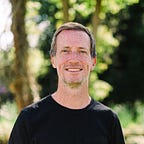Why you’re never too old to start a business (or reinvent your work)
Most people think startups are a young person’s game.
That entrepreneurship is for the young, hungry grads who love ramen.
But they’re wrong.
A Harvard study found that the average age of the most successful startup founders is actually 45.
In our 40s we might not have the zest of youth, but we have the clarity of thought, decades of life and work experience to call upon — and our old friend perspective.
As the years go by our sense of knowing becomes more fine tuned, we tolerate less noise and want to be more intentional about the work we want to do.
Our priorities shift from money and security, to freedom and contribution.
Carlos and I started The Happy Startup School when we were both nearly 40. And we launched Vision 20/20 with Lana (pictured above) when we were 46. We both turn 50 this month and I’ve no doubt that there are more reinventions and collaborations ahead.
A founder told me recently that one of his investors started his first business after he retired in his 60s.
Milestones like this get us thinking about what we want from our lives and our work, and we make decisions more intentionally – because we want to.
So never feel like you’re too old to make a change, whether that means starting a business or pivoting your career.
In fact you might be one of the young ones.
This reminds me of a Medium post I wrote a couple of years back.
It was inspired by the book 100 Year Life, and how there’s a whole area of innovation happening that most people aren’t aware of. It’s something Ayse Birsel addressed in her brilliant talk at last year’s Happy Startup Summercamp.
At the heart of the book is the concept of human ingenuity, where rather than being passengers, we’re called to become social pioneers in order to make the most of new technologies and longer, healthier lives.
However this means navigating a new life story — where we explore by learning and transitioning, and connect more deeply to others, but also to ourselves.
This means thinking more like a designer. Where you are more intentional about your work and life — treating it like a design project — rather than reactive to whatever comes your way.
To help get started, here are some questions to ask yourself:
- What would your 70, 80 or 100-year old self think of you now?
Can you be sure that the decisions you are making now will stand up to the scrutiny of your future self? - What is the point of work, for you?
As the three-stage working life becomes a thing of the past, we need to consider ways of redesigning life so that a longer working life becomes a gift that is energising, creative and fun rather than a necessarily evil. How can you learn to make the transitions that will be so crucial and experiment with new ways of living, working and learning? - How can you sustain yourself?
What are the most effective ways of boosting your physical and mental health over a longer and more dynamic lifespan? How can you nurture or grow your intangible assets — such as family, friends and networks — as you build a productive, longer life? - What learning and growth opportunities excite you?
What activities would you want to do even if you weren’t paid? What areas of interest, or new beginnings, are exciting you and keep gnawing away at you? What could you invest in now that might benefit your future self whether education, relationships or experiences — or something that brings them all together like Vision 20/20? - And the biggest question of all…who are you?
When lives are short, the concept of who you are develops without a great deal of insight of transformation. Yet when lives are long, what is the thread that connects the many transitions a person goes through?
What is it that remains essentially you? How can you carve out a career and life path that defines you and your values?
Read the full post
ps. If you’d like to plan out the next phase of your career or business — your second mountain — and learn how to monetise the knowledge, experiences and networks you’ve built on the first one, then consider joining Tribe 8 of Vision which starts in October. We’ve got a great group forming and are talking to people interested in taking part right now. Learn more and how to apply at vision.happystartups.co
